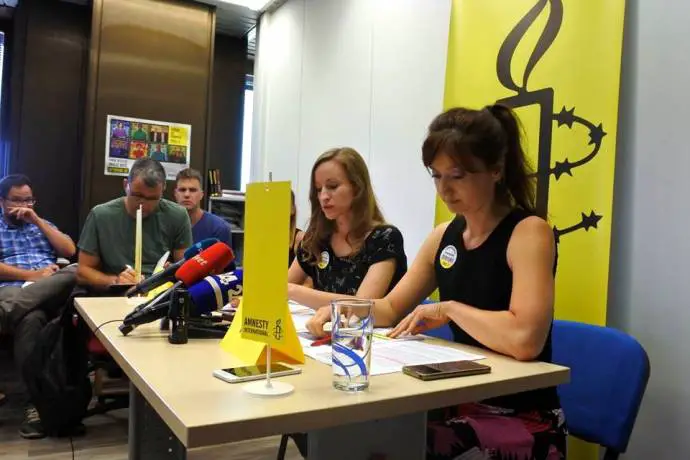Amnesty visited Velika Kladuša and Bihać in Bosnia-Herzegovina in late June and talked to 70 people; 58 had gotten to the Slovenian-Croatian border, of whom 51 wanted to request asylum but were returned to Croatia, Amnesty's campaign director Metka Naglič told the press on Thursday.
The testimonies confirmed that the Slovenian authorities restricted access to asylum and conducted push-backs without examining individual asylum requests and without providing recourse, says the report that Amnesty published concerning its mission to Bosnia.
Many refugees and asylum seekers said Slovenian police ignored their intention to request asylum, and some were even told that "there is no asylum in Slovenia," said Amnesty activist Jerneja Turin.
Some were requested to sign documents in Slovenian that they did not understand, while some were told by police they would be taken to asylum centres but were instead returned to Croatia.
The individuals returned to Croatia were chased by Croatian police back to Bosnia, had their money taken away and their mobile phones destroyed, while some even complained about violent Croatian officers, the report says.
Amnesty found three individuals who said Slovenian police were violent but their claims are yet to be verified. In any case, there is no evidence about systematic violence.
The report comes ten days after Dnevnik first reported that asylum seekers were being pushed back, claims that Slovenian police have denied.
The General Police Administration has said that the police fully honoured the rights of foreigners and was also cooperating regularly with NGOs that are following its work together with the UNHCR.
But Amnesty as well as PIC, a platform of NGOs, said today NGOs were not supervising police work.
PIC visited Bosnia at about the same time and arrived at the same conclusions despite a slightly different approach, Katarina Bervar Sternad said.
The claims by the NGOs would appear to be corroborated by police statistics, which show a change in June: despite the number of illegal border crossings decreasing, returns to Croatia increased substantially.
At the same time, the number of people registered as having the intention of requesting asylum dropped, according to the Amnesty report.
Among those illegally crossing the border, 60-80% expressed the intention of requesting asylum in January-May; in June that share fell to under 30%.
In May over 1,200 people were caught crossing the border and 145 were returned to Croatia; in June over two-thirds of the 900 who crossed the border illegally were returned.
The government's point-man on migrations, Interior Ministry State Secretary Boštjan Šefic, rejected the NGO's findings. He suggested that some who said they had been in Slovenia were in fact never here, while others were caught abusing the asylum procedure.
All those who request asylum are housed in asylum centres, "but the truth is that many such people immediately leave asylum centres before they even make a formal request." Such persons are then apprehended as illegal aliens and returned to where they came from.
Some others, meanwhile, were never in Slovenia. "These people are very well instructed," he said, noting that traffickers tell them what they have to say.
Turning to the surge in returns to Croatia in June, Šefic said that was nothing unusual considering the number of illegal crossings in May and June.
The report, in Slovenian, is available here.







